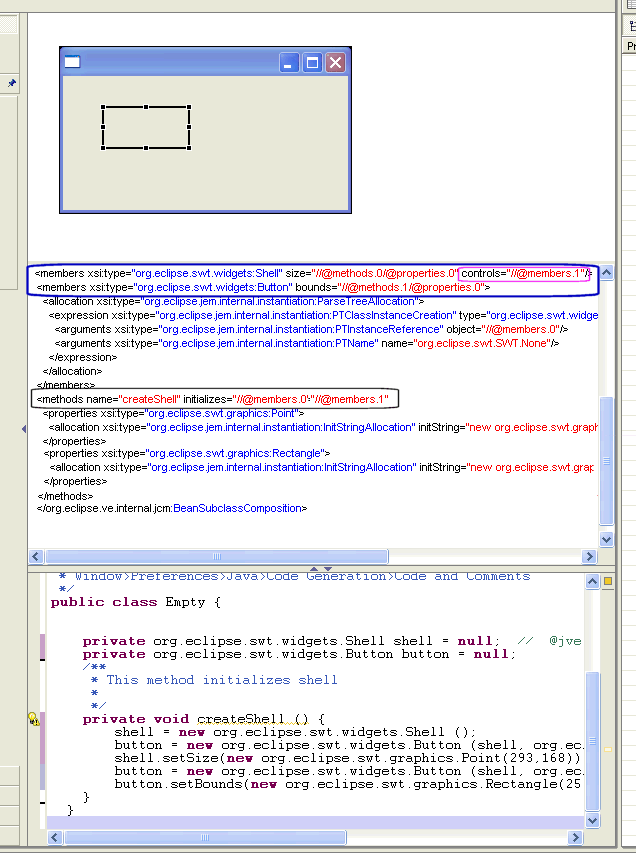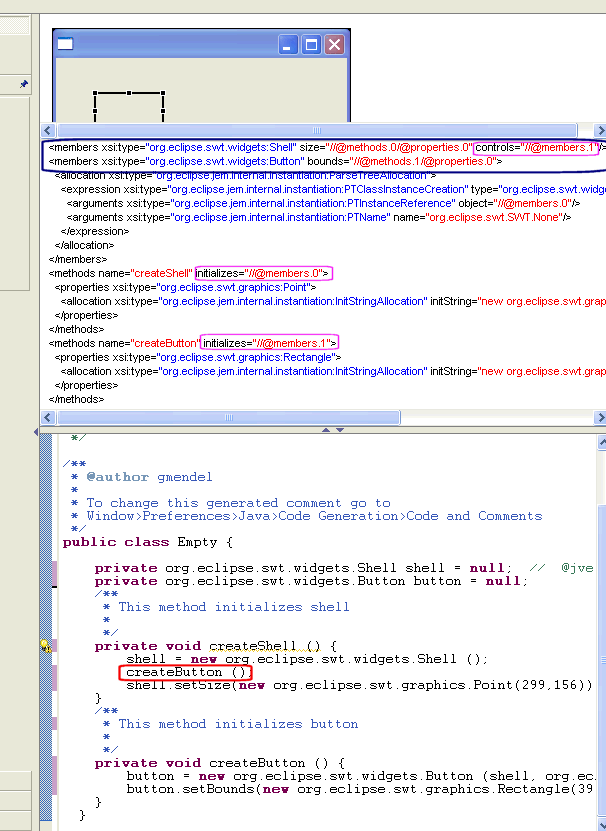[
Date Prev][
Date Next][
Thread Prev][
Thread Next][
Date Index][
Thread Index]
[
List Home]
|
RE: [ve-dev] SWT code patterns
|
Title: Message
I got
excited when I saw the screen shots below and wanted to see this work for
myself. So I:
- Got
the latest CVS build from head.
-
Deleted the package Gili mentioned in a previous post.
-
Created the following class (by hand), inside VE:
public class SWTTest {
org.eclipse.swt.widgets.Shell shell =
null;
private void createShell() {
shell =
new
org.eclipse.swt.widgets.Shell();
shell.setSize(new org.eclipse.swt.graphics.Point(640, 480));
}
}
If I
open VE on this class using the Package Explorer, it chugs for a second or so,
then I get a NPE dialog. When I hand-coded this inside VE, I got
nothing...
What
am I doing wrong?
(I'd
*love* to do a short, tightly scripted demo of VE for SWT at EclipseCon next
week during the VE session. Not to mention that this is just way
cool!)
Dave
We are in the
process of creating a skeleton SWT enabled driver to form the bases from which
to build the SWT extensions. An important part of it is the code
generation/parsing patterns that we intend to support. We need to
iterate on this a until we get it right. The first milestone goal (for
the iteration process) is to have a driver that can generate/parse similar
patterns to the driver that we have today. The problem is getFoo() for
SWT controls do not make any sense... so we need to move forward a bit.
.... so we are holding the following
first iteration goal assumptions which do not require any VE modeling
changes:
- One will not be able to drop anything but a
Shell or a parentless widget (e.g. Dialog) on the Free Form. If one is
to customize a Composite, they will use the create-wizard to create a
class that extends a Composite with a constructor that takes a parent (need
to talk more about flags). The target VM will know how to parent the
"this" part on the free form.
- Dropping a Shell will produce an instance
variable, private
org.eclipse.swt.widgets.Shell shell = null, and a create method private void
createShell () (private vs. public is tbd).
- Dropping a child on a container will
create an instance variable for the child, and reuse the parents
initialization method. ... it will produce the following code/EMF
model

Instance variables are created since both
the shell and the button are contained in the root membership of the model
(vs. a membership owned by a methods element - a local variable). The
"controls" feature denotes the parent/child relationship. The
initializes feature of the methods element denotes that createShell is used to
initialize both the shell/button.
This pattern would create a single method per top component.
=======================================================
Note that with bottom up parsing, VE
will also recognize the following:

In
this case we have the same shell and a button as a child. Both are instance
variables, but each is initialized by a different method.
The key here is that createShell() must call the create
method of the button.
In the case that the createButton() _expression_ is removed from
createShell(), CodeGen will remove the button (and if needed its
init method) from the VE EMF model... which implies that the GUI will only
show the Shell.
... this is a
first pass to the scenario where as a createButton() exists, but no one (that
we can understand) calls it. The WYSIWYG Free Form will reflect that.
This milestone does not take into
consideration factory methods.
------------
Dr. Gili Mendel
IBM
Software
Development
RTP Raleigh, NC
(919)543 6408, tie: 441
6408


